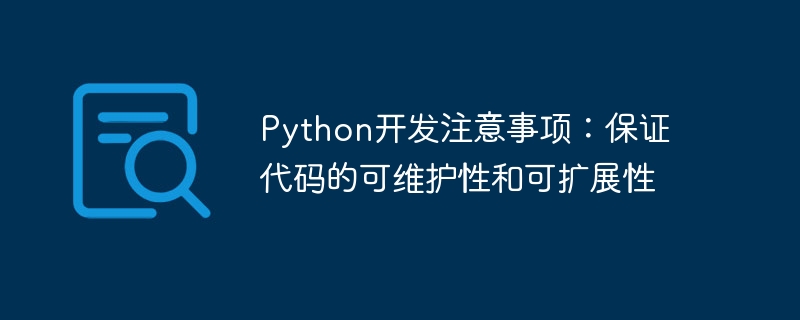

As a popular programming language, Python is widely used in various fields such as web development, data analysis, and artificial intelligence. When developing Python, it is very important to ensure the maintainability and scalability of the code. This article will introduce some Python development considerations to help developers write maintainable and extensible Python code.
A good code structure is the basis for ensuring code maintainability and scalability. In Python, you can build a clear code structure by using modules, packages, classes, and functions. Reasonably dividing different functional modules and using classes and functions to organize the code can make the code easier to understand and maintain.
The Python community has a series of coding standards, such as PEP 8, which provides some recommended coding styles and standards, including indentation, Naming conventions, comments, code layout, etc. Following these specifications can make the code more readable and maintainable. At the same time, using tools such as flake8 and pylint can help find potential problems in the code and improve code quality.
Good comments and documentation can help others understand the logic and purpose of the code more easily. Clear comments can help other developers understand the intent of the code when it comes to complex operations or special processing. In addition, writing documentation (such as that generated using sphinx) can be very useful to help others understand how to use your code.
Unit testing is an important means to ensure the correctness and maintainability of the code. Well-written unit tests can ensure that the original functionality of the code will not be destroyed after modification. There are many unit testing frameworks in Python, such as unittest, pytest, etc., which can be used to write and run unit tests.
Python has a rich set of standard libraries and third-party libraries that can help developers complete tasks more efficiently. During the development process, try to use Python's built-in functions and libraries to reduce the difficulty of development and improve the maintainability and scalability of the code.
In short, ensuring the maintainability and scalability of Python code requires developers to follow some basic principles and specifications, such as good code structure, clear comments and documentation, unit testing, etc. These are all keys to helping you write high-quality Python code. I hope this article can help developers better understand how to ensure the maintainability and scalability of Python code.
The above is the detailed content of Python development considerations: Ensure code maintainability and scalability. For more information, please follow other related articles on the PHP Chinese website!




